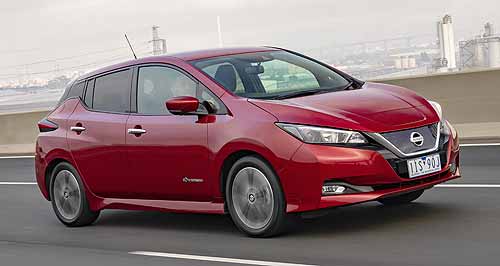News - General News - RegulationJapan aims to end ICE salesCharging up: From 2030, models like the Toyota Mirai (left) and Nissan Leaf (below) will become more popular in Japan as the nation looks to ban ICE vehicle sales. Global trend sees growing list of nations set deadlines to end fossil-fuel vehicles6 Dec 2020 By NEIL DOWLING JAPAN has become the latest nation to indicate it will cease sales of fossil-fuelled vehicles from 2030 as it favours electric vehicles and hybrids.
The move aligns Japan with the UK, some states in the US and Canada, Germany, Norway, Denmark, Spain, China, South Korea and Germany. The EU is to vote on restrictions on internal-combustion engines (ICEs) later this month.
The UK has come a long way in a short time on electric vehicles with EV sales tripling this year compared with 2019. It now ranks third in Europe for total number of EVs and has more than 390,000 plug-in cars on its roads, up from only 3500 in 2013.
In 2019, 56 per cent of all new cars sold in Norway were EVs or PHEVs. It has incentives for EV owners including no annual road tax or import taxes; a 25 per cent VAT (GST) exemption; free parking; and compensation for scrapping ICE vans, among others.
The rapid move to EVs comes as independent energy analyst, the London-based Carbon Tracker group, reports that switching to EVs could save emerging markets up to $US250 billion ($A336b) a year on oil imports by 2030 – enough to pay for the infrastructure needed to support electrified transport.
Carbon Tracker said a move away from oil as a transport fuel would cut global oil demand by 70 per cent.
It defined emerging markets as those expanding the sales of vehicles. These include China, India, South East Asia and most of Africa.
The analyst said these markets spend huge sums on oil imports, costing China 1.5 per cent of its GDP (equivalent to $A282 billion) and 2.6 per cent of that in India ($A98 billion) adding that 68 per cent of oil imports go to transportation.
“Annual savings by electrifying transport would be over $US80 billion ($A108 billion) in China and over $US35 billion ($A47 billion) in India,” it said.
Japan’s indication that it would ban ICE vehicle sales is in line with a pledge by prime minister Yoshihide Suga in October for the country to cut carbon emissions to zero on a net basis by 2050.
It makes it the second G7 nation – after Britain – in a little over two weeks to set a deadline for phasing out gasoline vehicles.
Japan's industry ministry said it will map out a plan by the end of this year.
The change to EVs are in line with existing research and development and production planning measures in place by car-makers including Toyota and Nissan.
Nissan chief operating officer Ashwani Gupta last month told Reuters that Nissan was ready to accelerate the end of ICEs and have EV cars and vans in place for Britain by the UK’s 2030 deadline.
Volvo this week said it expected all its vehicles to be EVs by 2030 and that half of its model range would be electrified by 2025.
Volvo CEO and president Hakan Samuelsson told the Financial Times Future of the Car Summit this week that the car-maker had planned to have one in five sales this year to be electrified vehicles and 50 per cent to be EVs by 2025.
It makes Volvo only the second global brand after Bentley to announce it will make only EVs by 2030.
Bentley has announced it will start switching its ICE models to either plug-in hybrid (PHEV) or battery EVs by 2026 and aims to be carbon-neutral within a decade. By 2030, all of its cars will be EVs.
Bentley chief executive Adrian Hallmark said: “Within a decade, Bentley will transform from a 100-year-old luxury car company to a new, sustainable, wholly ethical role model for luxury.”
It will not come without some turmoil. Bentley has announced it will cut its workforce by up to 25 per cent in the transition to an electrified car manufacturer.
General Motors has also announced an EV future with plans to launch 30 EVs by 2025. It said it would invest $US27 billion ($A36b) in EVs before that date, up from the $US20b ($A27b) it pledged to the task in an announcement earlier this year.  Read more |
Click to shareGeneral News articlesResearch General News Motor industry news |
















Facebook Twitter Instagram